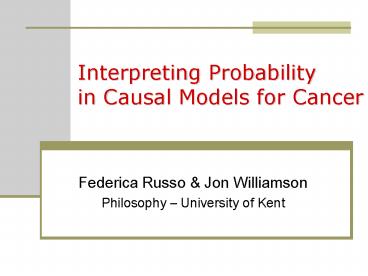Interpreting Probability in Causal Models for Cancer - PowerPoint PPT Presentation
1 / 12
Title:
Interpreting Probability in Causal Models for Cancer
Description:
Title: Interpreting probability in causal models for cancer Author: Federica Russo Last modified by: fr Created Date: 6/7/2006 3:49:25 PM Document presentation format – PowerPoint PPT presentation
Number of Views:92
Avg rating:3.0/5.0
Title: Interpreting Probability in Causal Models for Cancer
1
Interpreting Probability in Causal Models for
Cancer
- Federica Russo Jon Williamson
- Philosophy University of Kent
2
Overview
- Cancer epidemiology
- Interpretations of probability
- Desiderata
- Frequency-cum-Objective Bayesianism
- Risks, odds and probabilities
3
Cancer epidemiology
- A double objective
- Establishing generic claims
- Non-smokers have a statistically significant
greater risk (25) of lung cancer if their
spouses are smokers - Applying the generic in the single-case
- Audry, who has metastatic breast cancer, will
survive more than 5 years, to extent 0.4 - Both are probabilistic statements
4
Interpretations on the market
- Classical and logical
- P ratio of favourable cases / of all
equipossible cases - Physical frequency and propensity
- P limiting relative frequency of an attribute
in a reference class - P tendency of a type of physical situation to
yield an outcome - Subjective
- P quantitative expression of an agents
opinion, - degree of belief or epistemic attitude
- Objective Bayesian
- P degree of belief shaped on empirical and
logical constraints
5
Desiderata
- Objectivity
- Account for the objectivity of probability
- Calculi
- Explain how we reason about probability
- Epistemology
- Explain how we can know about probability
- Variety
- Cope with the full variety of probabilistic
claims - Parsimony
- Be ontologically parsimonious
6
Lets bargain
Class/ Log Prop Freq Subj Emp- Based Obj Bayes
Objectivity ? ? ? ?
Calculi ? ?
Epistemology ? ? ? ? ?
Variety ? ? ?
Parsimony ? ?
7
Deal! Frequency-cum-ObjectiveBaysianism
- Pluralism is a viable option
- Generic causal claims require
- a frequency interpretation
- Single-case causal claims require
- an objective Bayesian interpretation
- Objective Bayesianism has
- pragmatic virtues
8
Risks, Odds and ProbabilitiesEasy to compute
- Risks and odds compare proportions
Factor Disease Disease
Factor Yes No
Exposed n11 p11 n12 p12
Unexposed n21 p21 n22 p22
9
Risks, Odds and ProbabilitiesTricky to interpret
- a RR equal to 2.0 means that an unexposed
person is twice as likely to have and adverse
outcome as one who is not exposed - (Sistrom Garvan 2004)
- odds and probabilities are different ways of
expressing the chance that an outcome may occur - (Sistrom Garvan 2004)
- the probability that a child with eczema will
also have fever is estimated by the proportion
141/561 (25.1) - (Bland Altman 2000)
10
To sum up
- In the context of cancer epidemiology
- Two categories of causal claims
- Generic single-case
- These are probabilistic
- The market offers
- Classical/Logical, Physical,
- Subjective, Objective Bayesian
- We went for
- Frequency-cum-Objective Bayesianism
11
Conclusions and what next?
- Epidemiology
- looks for socio-economic biological causes
- ? Thus its paradigmatic of the
- social and health sciences
- models causal relations with probabilities
- ? Thus it raises genuine interest for the
philosophy of causality and probability - is concerned with generic and single-case claims
- ? Thus gives us further questions
- the levels of causation
12
Any comments, queries, objections, complaints
about the paper?Please call the Helpdesk
- Many thanks to the British Academy and the FSR
(UcLouvain) for funding the projectCausality
and the Interpretation of Probability in the
Social and Health Scienceswww.kent.ac.uk/secl/ph
ilosophy/jw/2006/CausalityProbability.htm































